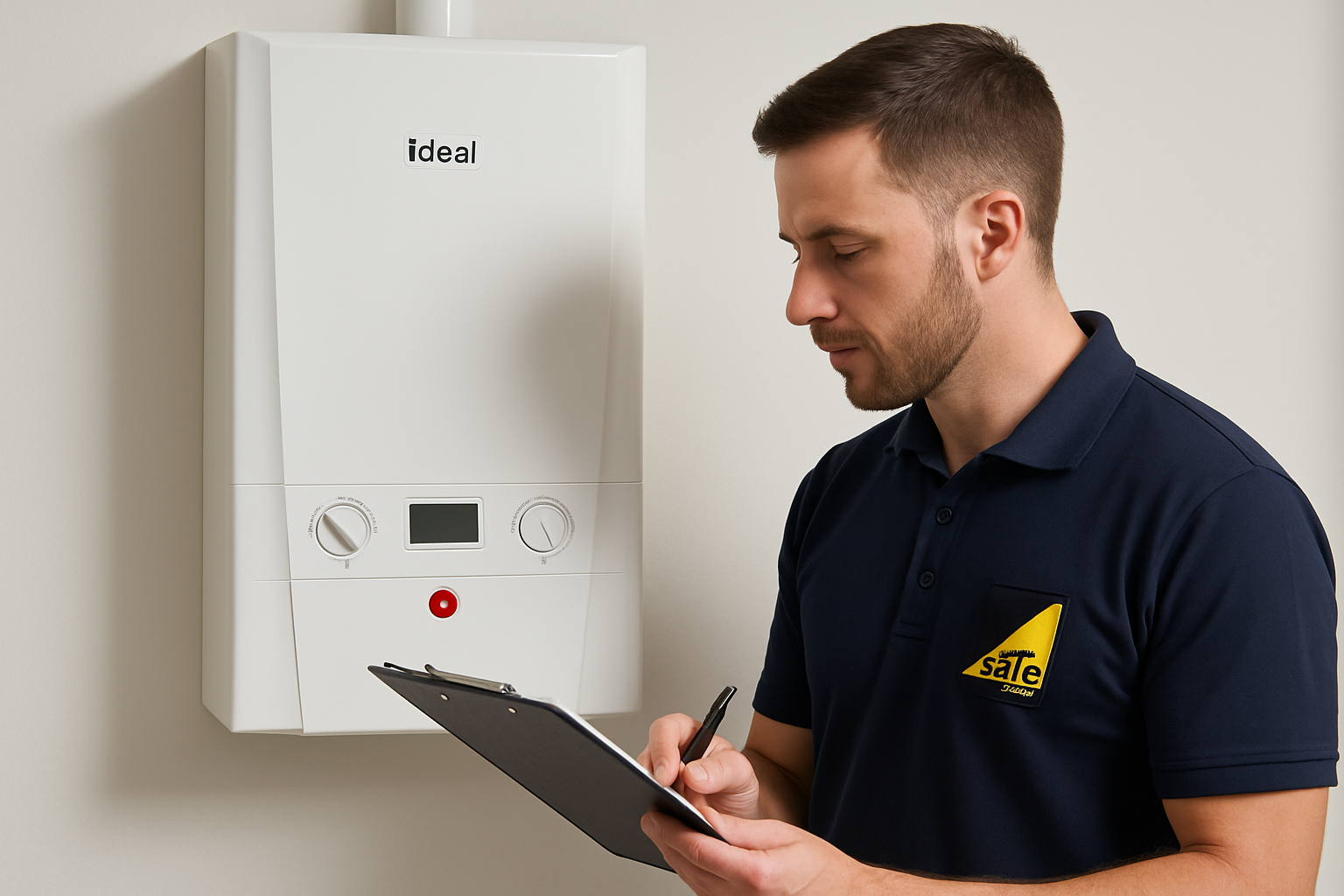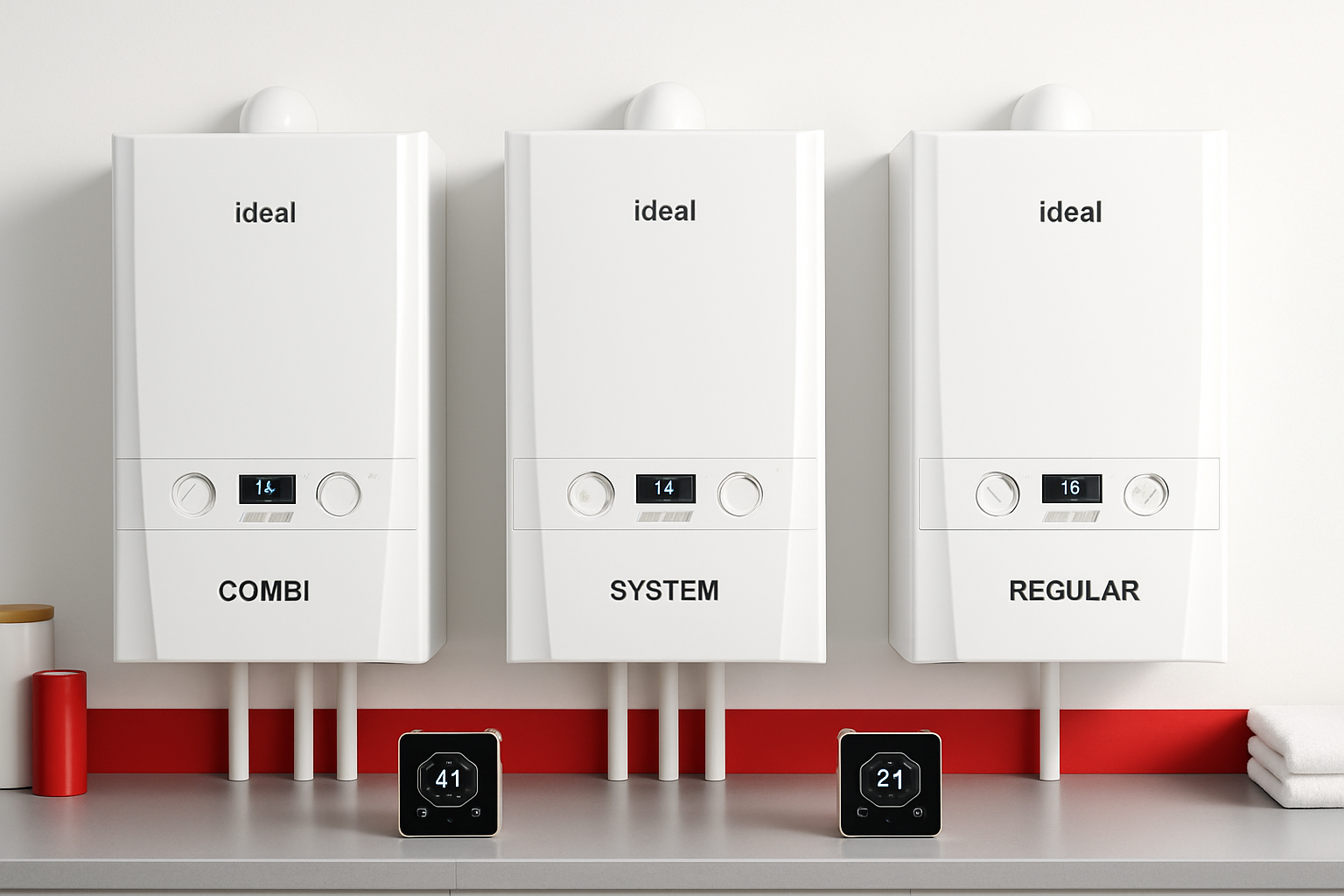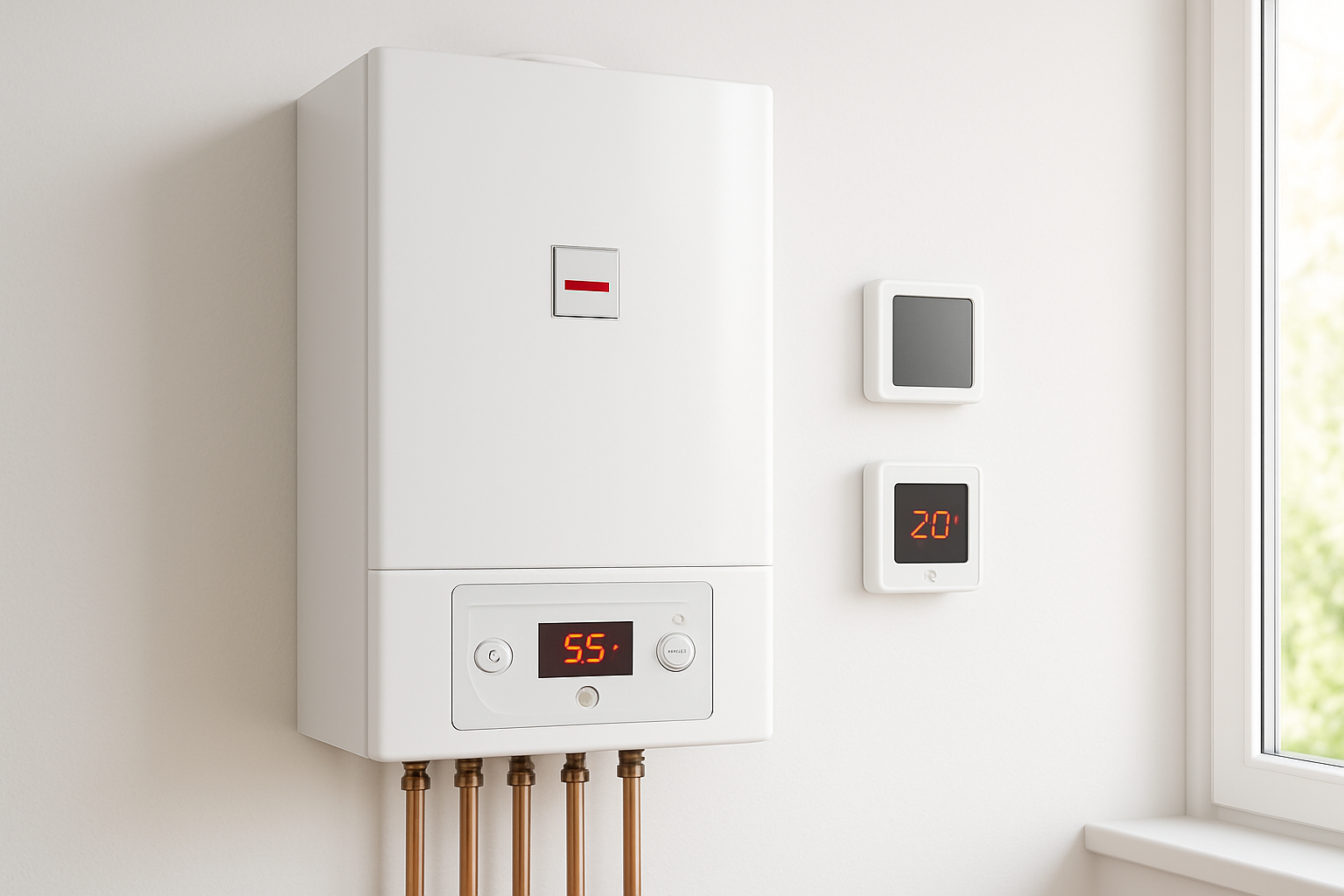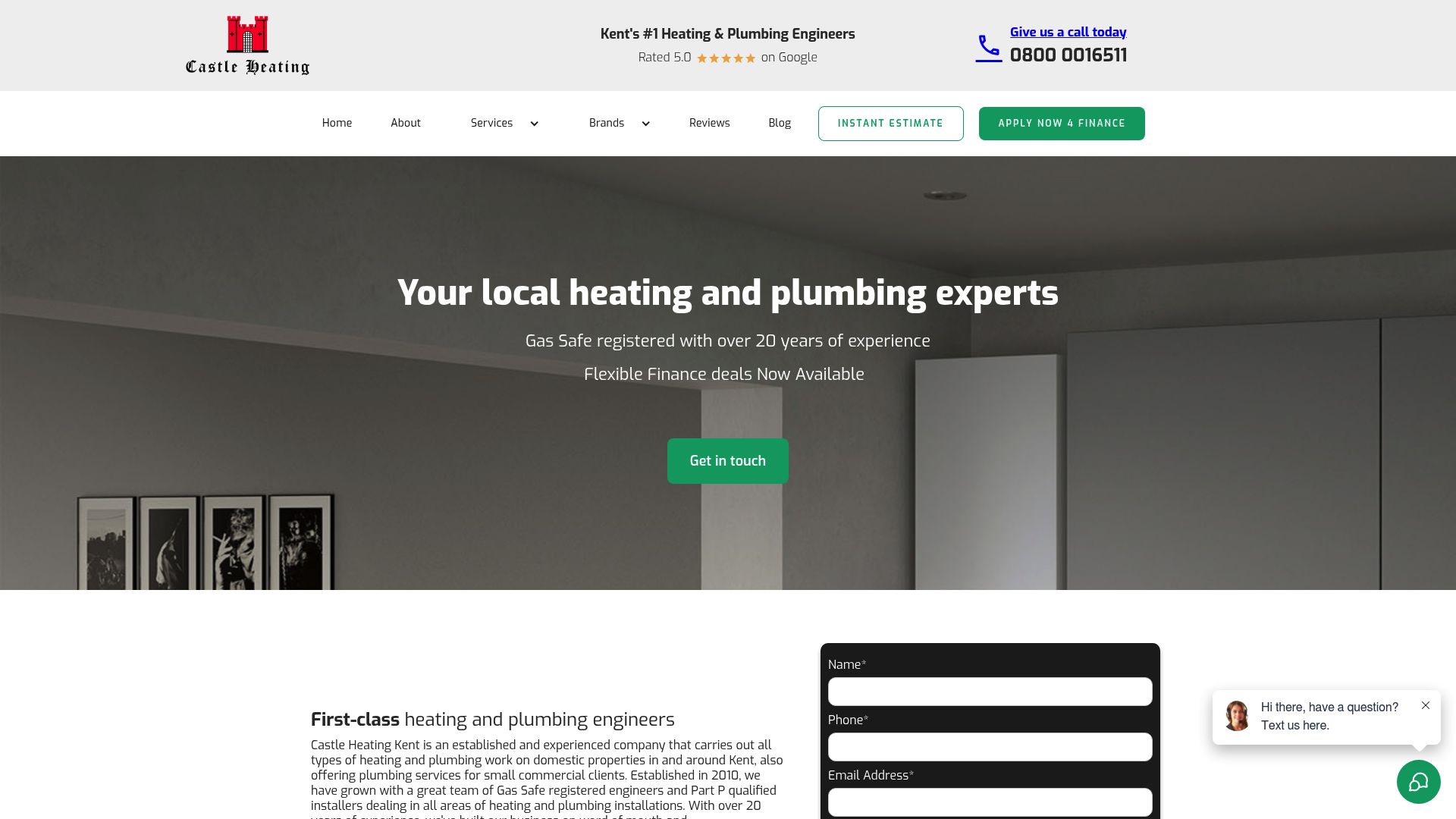Ideal Boilers Guide: Expert Insights for 2025
With energy prices on the rise and new heating regulations on the horizon, finding the right solution to keep your home warm in 2025 is more important than ever.
This expert-led guide unpacks everything homeowners and property managers need to know about ideal boilers, from trusted models to the latest technologies and government standards.
You’ll discover comprehensive overviews, key features for 2025, energy efficiency updates, installation and maintenance advice, cost breakdowns, and insider tips for choosing the perfect fit.
Ready to take control of your home’s comfort and efficiency? Use this guide to make informed, confident decisions about your next boiler investment.
Understanding Ideal Boilers: Brand Overview and Reputation
Choosing the right heating system is crucial for comfort and efficiency. Ideal boilers have become a household name for homeowners and property managers seeking reliable performance and peace of mind. Their reputation is built on decades of innovation, quality, and customer trust.

Company History and Market Position
Ideal boilers have a rich heritage dating back over a century, evolving from their origins in the early 1900s to become a key player in the UK heating market. The brand stands out for its commitment to quality and reliability, often being compared favourably with other leading manufacturers such as Worcester, Vaillant, and Baxi.
Ideal boilers are known for serving both domestic households and small commercial properties, making them a versatile choice across sectors. Their presence is especially strong in regions like Kent and the Southeast, where many homes rely on their solutions for consistent warmth.
Key trust indicators for ideal boilers include:
- Gas Safe registration
- Which? Trusted Trader status
- High customer satisfaction ratings
Customer reviews often highlight the brand’s reliability and the ease of working with local installers. For those interested in more about the brand’s evolution, the Ideal Boilers company history offers deeper insights into its market journey and reputation.
Core Technologies and Innovations
Ideal boilers are at the forefront of heating technology, consistently introducing innovations that make life easier for homeowners. Their modern condensing technology increases efficiency, reducing both energy bills and carbon emissions. User-friendly designs mean that installation and daily operation are straightforward, even for those new to modern boilers.
One standout feature is the integration with smart home systems. Many ideal boilers can be paired with smart thermostats, allowing for remote access and precise temperature control from your phone or tablet. This not only improves comfort but helps optimise energy usage throughout the year.
Safety remains a top priority. Ideal boilers are built to meet rigorous UK standards, with features like built-in frost protection and advanced diagnostics. Their compatibility with energy management systems makes them a future-ready choice for those looking to upgrade.
Warranty and Aftercare
Warranty and aftercare are central to the appeal of ideal boilers. Most models come with a standard warranty ranging from 2 to 10 years, depending on the specific product. Extended warranties are available, providing extra peace of mind for those wanting long-term protection.
Ideal boilers offer comprehensive aftercare packages, including regular servicing and dedicated customer support. Their network of Gas Safe registered engineers ensures that help is always close at hand, whether it’s for routine maintenance or urgent repairs.
Many customers share positive experiences about the responsiveness of Ideal’s support team. For example, homeowners in Kent often praise the brand’s quick turnaround and clear communication when dealing with aftercare needs. This level of service reinforces why so many trust ideal boilers for their heating solutions.
Top Ideal Boiler Models for 2025: Features, Performance & Suitability
Choosing the right heating system has never been more important, and ideal boilers remain a top choice for UK homes in 2025. With a range of models designed to suit different property types, understanding the options can help you make a confident, future-ready decision.

Combi, System, and Regular Boilers Explained
When it comes to ideal boilers, knowing the difference between combi, system, and regular types is key. Each boiler type has unique advantages and is suited to specific home layouts and hot water needs.
- Combi boilers are compact, all-in-one units that provide instant hot water and heating. They are ideal for small-to-medium homes with limited space and moderate hot water demand.
- System boilers require a separate hot water cylinder but no cold water tank. They’re perfect for homes with multiple bathrooms or higher hot water use.
- Regular (heat-only) boilers need both a hot water cylinder and a cold water tank. These are common in older properties or large homes with traditional heating systems.
Combi boilers dominate the UK market, accounting for over 70% of new installs. For example, a family in a two-bedroom flat might choose a combi model, while a four-bedroom house with two showers would benefit from a system boiler. Understanding your property’s needs will help you narrow down the best ideal boilers for your situation.
Best-Selling Ideal Models for 2025
Ideal boilers continue to lead with models that blend efficiency, flexibility, and smart features. Here’s a quick look at their flagship models for 2025:
| Model | Boiler Type | Output Range (kW) | Efficiency (%) | Best For |
|---|---|---|---|---|
| Logic+ Combi | Combi | 24–35 | 94 | Flats, small/medium homes |
| Vogue Max | System/Combi | 26–40 | 93–94 | Larger homes, multiple bathrooms |
| Logic Max | Combi/System | 24–35 | 94 | Versatile, all-round solution |
The Logic+ Combi stands out for its compact size and high efficiency, making it a favourite in smaller homes. The Vogue Max offers robust performance and reliability, ideal for larger properties. Logic Max provides a balance between price, performance, and installation flexibility.
When selecting among ideal boilers, consider factors like available space, water usage, and ease of installation. For tailored advice and professional fitting, Ideal Boiler Installation Services can help match the right model to your home.
New and Upcoming Releases
Innovation continues to drive ideal boilers forward in 2025. The brand is embracing the shift towards lower-carbon heating technologies, including hydrogen-ready and hybrid-compatible models.
- Hydrogen-ready boilers are being introduced, designed to run on both natural gas and up to 20% hydrogen blends, making them future-proof for upcoming energy transitions.
- Hybrid systems combine a high-efficiency boiler with renewable energy sources, such as heat pumps or solar thermal panels, further reducing carbon emissions.
- New releases focus on smart integration, with enhanced digital controls and compatibility with leading smart thermostats.
For example, the anticipated Logic+ Hydrogen model will offer the same reliability as existing models but with enhanced eco-credentials. These new ideal boilers are perfect for environmentally conscious homeowners wanting to stay ahead of government regulations and energy trends.
Pros and Cons of Each Model
Every heating system has its strengths and weaknesses. Here’s a quick rundown for the top ideal boilers:
Logic+ Combi
- Pros: Compact, energy-efficient, easy to install, low maintenance.
- Cons: Not suitable for homes with very high hot water demand.
Vogue Max
- Pros: High output, robust build, long warranty, ideal for larger homes.
- Cons: Larger footprint, higher upfront cost.
Logic Max
- Pros: Flexible, reliable, good value, compatible with multiple systems.
- Cons: May require additional controls for maximum efficiency.
User feedback highlights the reliability and longevity of ideal boilers, with most models praised for quiet operation and ease of use. However, it’s important to match the boiler size and type to your property’s needs to avoid performance issues or unnecessary running costs.
By weighing these pros and cons, you can select the ideal boilers model that delivers comfort, efficiency, and peace of mind for years to come.
Energy Efficiency, Regulations, and the Future of Home Heating
Staying ahead with efficient heating is more important than ever. As we move toward 2025, both homeowners and property managers are searching for ways to balance comfort, cost, and environmental responsibility. Ideal boilers continue to play a crucial role in this evolving landscape, offering solutions that not only heat homes reliably but also help meet new regulatory and sustainability goals.

Boiler Efficiency Ratings and What They Mean
Understanding how ideal boilers achieve their impressive efficiency starts with decoding the ratings. Modern boilers in the UK are assessed using ErP (Energy-related Products) ratings and SEDBUK (Seasonal Efficiency of Domestic Boilers in the UK) scores. Both systems measure how much fuel a boiler converts into usable heat versus how much is wasted.
Most ideal boilers today are A-rated, meaning they operate at 90% efficiency or higher. This not only reduces energy bills but also cuts down on wasted fuel. The table below summarises typical efficiency standards:
| Boiler Type | Average Efficiency | Rating (ErP) |
|---|---|---|
| Old Non-Condensing | 60–70% | D–E |
| Modern Condensing | 90–94% | A |
By choosing ideal boilers, homeowners can expect significant improvements in both performance and environmental impact.
2025 Government Regulations and Incentives
Regulations for heating systems are tightening, with 2025 marking a major turning point. The UK government will require all new boiler installations to meet higher efficiency and smart control standards. This includes mandates for weather compensation controls, programmable timers, and minimum ErP ratings.
Ideal boilers are designed to comply with these evolving requirements, ensuring future-proof installations. For those planning upgrades or new systems, it's essential to understand the upcoming rules. You can find full details and official guidance on the UK boiler efficiency regulations 2025 page.
Government incentives, like the Clean Heat Grant, also encourage the adoption of greener heating solutions. This makes ideal boilers a smart investment for homeowners seeking both compliance and savings.
Eco-Friendly Features and Low-Carbon Heating
As the UK aims for net zero, ideal boilers are evolving to support low-carbon living. Many models are now hydrogen-ready, meaning they can run on a blend of natural gas and hydrogen, reducing emissions without major changes to your heating system.
Hybrid-compatible ideal boilers can be paired with renewable technologies, such as solar thermal panels or heat pumps. This integration allows households to further cut their carbon footprint while maintaining reliable heating and hot water.
Safety and compliance are never compromised, with built-in features that meet or exceed the latest UK standards. Ideal boilers are helping pave the way for a greener, more sustainable future.
Cost Savings and Environmental Impact
Switching to high-efficiency ideal boilers can lead to substantial savings over time. On average, upgrading from an old non-condensing boiler to a modern model can cut annual energy bills by up to £300. Reduced fuel use means lower carbon emissions, supporting both household budgets and the environment.
Here's a quick look at the benefits:
- Lower monthly energy bills
- Reduced greenhouse gas output
- Increased property value
Choosing ideal boilers is a smart step for anyone who wants to stay ahead of energy trends and regulations while enjoying reliable, eco-friendly warmth.
Installation, Servicing, and Maintenance: What Homeowners Need to Know
Keeping your heating system in top condition is essential for comfort, efficiency, and safety. When it comes to ideal boilers, understanding the right approach to installation, servicing, and maintenance makes all the difference. Let's break down what you need to know as a homeowner or property manager.
Choosing the Right Installer
Selecting the right professional is the first step to getting the most from ideal boilers. Always use a Gas Safe registered engineer for installation. This ensures all work meets strict UK safety standards.
You can verify an installer's credentials by checking their ID card or visiting the Gas Safe Register official site. Never be tempted by cheaper, uncertified installers—improper fitting of ideal boilers can lead to dangerous gas leaks, invalid warranties, and costly repairs.
Ask for references and look for trusted accreditations like Which? Trusted Trader status. This way, you protect your home and guarantee optimal performance from your new ideal boilers.
Installation Process: Step-by-Step
The installation of ideal boilers involves several clear steps. First, a qualified engineer will assess your property and recommend the right boiler size. Accurate sizing is crucial for efficiency and comfort.
Next, the old boiler is safely removed and the system is prepared for the new unit. The engineer then fits the new ideal boilers, connects all pipework, and installs controls. After everything is in place, the system is thoroughly tested and commissioned.
A typical installation takes one to two days, depending on system complexity. Throughout, clear communication with your installer ensures you know what to expect at each stage.
Annual Servicing and Maintenance Tips
Annual servicing is vital to keep ideal boilers running safely and efficiently. Regular maintenance not only extends the boiler's life but also keeps your warranty valid.
During a service, an engineer will check all safety devices, clean components, and test system performance. They'll also look for signs of wear or leaks. Spotting issues early can prevent costly breakdowns later. For detailed information on what a service includes and how it benefits your system, see Boiler Servicing and Maintenance.
Stay proactive—schedule your service before winter and keep records for future warranty claims.
Repair, Support, and Warranty Claims
Even the best ideal boilers may need repairs from time to time. If you notice loss of pressure, strange noises, or no heating, contact a qualified engineer promptly to avoid further damage.
Most ideal boilers come with a standard warranty, covering key parts and labour. If a problem arises, check your warranty documentation and contact the manufacturer or your installer for guidance.
Quick response during colder months is especially important. Many local partners offer emergency support, making it easier to restore warmth and peace of mind in your home.
Castle Heating Kent: Local Expertise for Ideal Boiler Installation and Servicing
For those in Kent and surrounding areas, Castle Heating Kent is a trusted name for installing, servicing, and repairing ideal boilers. With over 20 years of experience and a team of Gas Safe registered engineers, they’ve built a reputation for reliability and customer care.

Their services cover everything from new installations to annual maintenance and emergency repairs. As a Which? Trusted Trader with a 5-star Google rating, they offer peace of mind alongside flexible finance options and instant online estimates.
Positive reviews and word-of-mouth recommendations highlight why so many homeowners trust Castle Heating Kent for their ideal boilers needs.
Cost Considerations: Pricing, Finance & Value for Money
With energy prices fluctuating and efficiency at the forefront of every homeowner’s mind, understanding the true cost of ideal boilers is essential. From upfront prices to long-term savings and finance options, it’s important to weigh every aspect before investing. Let’s break down what you need to know to get the best value for your heating upgrade.
Average Costs for Ideal Boiler Models
When it comes to ideal boilers, prices vary depending on the type and model you choose. Combi boilers are typically the most popular and cost-effective for smaller homes, while system and regular boilers suit larger properties or those with higher hot water demand.
Here’s a quick comparison of average prices (including VAT, excluding installation):
| Boiler Type | Price Range (2024-2025) | Typical Property Size |
|---|---|---|
| Combi | £700–£1,300 | Flats, small homes |
| System | £900–£1,500 | Medium–large homes |
| Regular | £1,000–£1,700 | Large/older properties |
Installation costs for ideal boilers usually add £600–£1,200, depending on complexity. For example, a Logic+ Combi, including standard installation, often totals around £1,800–£2,200. Factors like boiler output, flue type, and any required system upgrades will influence your final price.
Running Costs and Energy Bill Savings
One of the biggest benefits of ideal boilers is their high efficiency, which translates to lower running costs. Modern condensing models can cut annual gas usage significantly compared to older, non-condensing units.
For a typical three-bedroom home, running costs with a new ideal boilers model average £500–£650 per year, depending on usage and tariff. Upgrading from an outdated boiler could reduce bills by up to 30%, saving hundreds annually.
These savings add up fast, helping to offset your initial investment. Over a boiler’s lifespan, the total cost of ownership with ideal boilers is often much lower than sticking with an inefficient system.
Finance Options and Grants
Worried about the upfront costs of ideal boilers? Flexible finance options are increasingly available, letting you spread payments over affordable monthly instalments. Many installers offer 0% interest or low-rate plans, making upgrades accessible for most budgets.
Homeowners may also be eligible for government grants or incentives, such as the Boiler Upgrade Scheme, especially if replacing an old, inefficient boiler. In Kent and beyond, local providers can help you check eligibility and secure funding. For a full overview of what’s available, take a look at these Boiler Finance Options to see how you could make your upgrade more affordable.
Value for Money and Long-Term Investment
Choosing ideal boilers is a smart long-term investment. With an average lifespan of 10–15 years, modern models offer reliable performance, low maintenance, and improved energy ratings. The savings in energy bills often outweigh any extra maintenance costs.
A new, efficient boiler can also boost your property value and appeal to potential buyers. Plus, with extended warranties and robust aftercare, ideal boilers ensure peace of mind for years to come.
Hidden Costs and How to Avoid Them
It’s easy to overlook hidden costs when budgeting for ideal boilers. Common extras include:
- Upgraded flues or pipework
- Smart controls or thermostats
- System flushing or water treatment
- Disposal of the old boiler
To avoid surprises, always request a detailed, itemised quote from a reputable installer. Choose Gas Safe registered professionals for accurate pricing and safe installation. Comparing multiple quotes and reading customer reviews can help you spot potential red flags and ensure you get true value for your money.
Expert Tips: How to Choose the Best Ideal Boiler for Your Home
Choosing the right boiler can feel overwhelming, but a step-by-step approach ensures you get the best fit for your property. Here’s how to make an informed decision about ideal boilers, whether you’re upgrading or starting fresh.
Assessing Your Home’s Heating Needs
Start by evaluating your property’s size, number of bathrooms, and daily hot water usage. For instance, flats or smaller homes may need a compact combi, while large family homes with multiple bathrooms often require a higher-capacity system. Matching the right ideal boilers model to your needs prevents wasted energy and ensures comfort throughout winter. Always consider future plans, like renovations or extensions, when making your assessment.
Comparing Models and Features
Take time to compare the features, output levels, and efficiency ratings of different ideal boilers. Look for models that offer smart controls, compact designs, and strong warranties. If you want to future-proof your investment, consider hydrogen-ready boilers and low-carbon heating for compliance with upcoming UK regulations. Reviewing user feedback and energy ratings helps you narrow down choices that match your household’s needs.
Installation Location and Space Considerations
Think about where your new boiler will be installed. Some ideal boilers are designed for cupboards or tight spaces, making them ideal for flats or smaller homes. Ensure there’s enough clearance for maintenance and safe operation. The location should allow for efficient pipework and minimal disruption, both during installation and future servicing. Discuss possible options with your installer to find the most suitable spot.
Smart Controls and System Integration
Modern ideal boilers work seamlessly with smart thermostats and home energy management systems. Integrating these controls lets you adjust heating from your phone and optimise energy use with ease. Features like weather compensation and remote diagnostics are increasingly common. This not only boosts comfort but can also lead to noticeable energy bill savings over time. Look for models with proven compatibility and user-friendly interfaces.
Working with a Professional Installer
Choosing a Gas Safe registered expert is essential when fitting ideal boilers. A professional will assess your home, recommend the best model, and provide a transparent quote. Ask about their experience with your chosen boiler brand and request references or customer reviews. Comparing at least two quotes helps you spot any unusual charges. Professional installation also protects your warranty and ensures compliance with safety standards.
Common Mistakes to Avoid
Avoid common pitfalls by steering clear of these mistakes:
- Picking the wrong boiler size or type for your property.
- Overlooking the importance of regular maintenance and servicing.
- Ignoring installer credentials or failing to check reviews.
- Forgetting to factor in future needs or building changes.
- Neglecting to ask about warranty terms and aftercare support.
Learning from others’ experiences helps you sidestep unnecessary costs and headaches.
Preparing for 2025 and Beyond
Stay ahead of regulatory changes by choosing ideal boilers that meet or exceed the latest efficiency standards. The UK is moving towards lower-carbon heating, so selecting a model compatible with hydrogen and renewables is a wise investment. Keep up with government incentives or grants, as these can make upgrades more affordable. With the right planning, your heating system will be ready for both today’s needs and tomorrow’s innovations.
If you’re considering an Ideal Boiler upgrade for 2025, it’s all about making the right choice for your home and your peace of mind. With so many models and new technologies on the market, having expert advice and a trusted installer really makes a difference. At Castle Heating Kent, we’ve spent over 20 years helping local homeowners in places like Rochester and Gravesend get the most from their heating. If you’re ready to chat about your options or just want some friendly advice, why not Call Now on 01634790511 or 0800 0016511?

